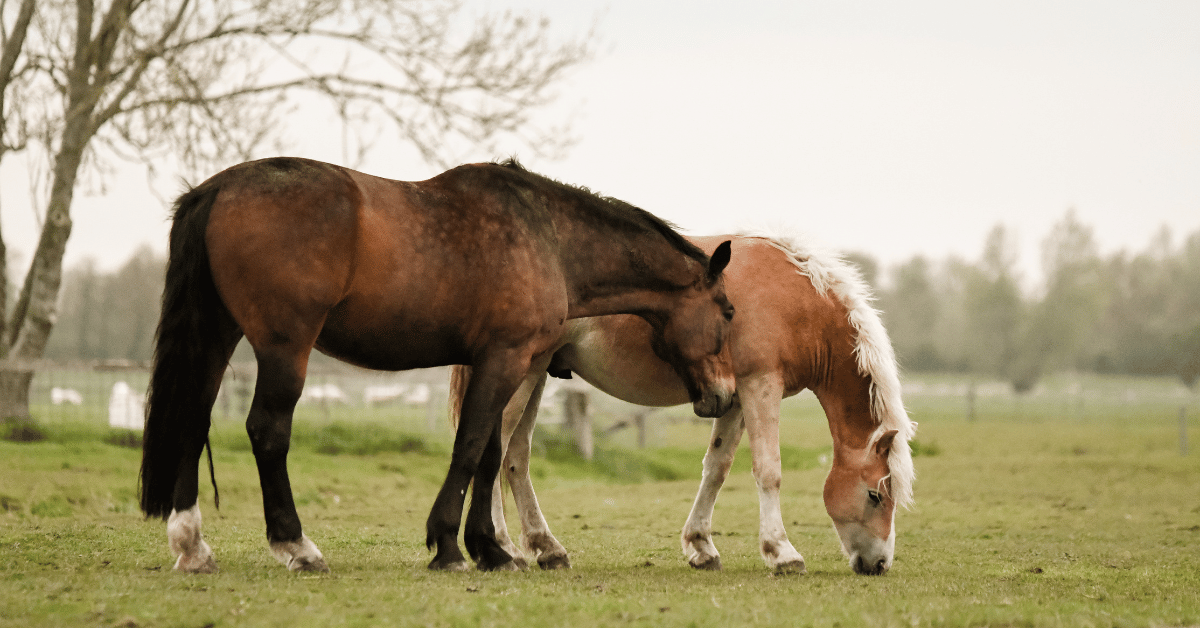Horse feeding: Is it really that complicated these days?
Inorganic or organic minerals. Sugar-free, GMO-free, soy-based or not. Basic pellets, sport feed, muesli, mash, supplements, natural, organic, back to nature, for sensitive stomachs or itchy horses. Just reading the labels on feed bags can feel overwhelming. And if you try to dive deeper into nutrition, you quickly get the impression that you’re doing it wrong – according to forums, social media, and feed brand marketing. That’s why this article goes back to basics: what horses truly need, with a healthy dose of common sense.
Feeding
.png)
1 October '25 • 2 min reading time
Forage: the foundation of the ration
Horses should eat forage for most of the day. Forage is a broad concept, but most owners think of hay. Yet forage includes more: herbs, twigs, straw, bark – basically everything a horse would find in nature. This makes forage the true foundation! The quality of your hay is crucial for your horse’s health. Poor quality affects the stomach, gut flora, immune system, digestion, energy, and performance. The nutrition of your horse stands or falls with forage quality.
Silage, haylage, or hay
This is actually simple, though often confusing. Hay is the only type truly suitable for horses – the unpackaged bales with strings or nets. This is designed for horses and, if good quality and mold-free, does not disturb their health. Silage is meant for cattle and is unhealthy for horses. The moist, sour-smelling feed disrupts their system. Haylage falls between silage and hay but is still wrapped in plastic. Wrapping always triggers fermentation, creating acids that lead to acidosis and health problems such as watery manure. The best option: always feed your horse unpackaged hay.
Balancer or concentrates?
Balancer
A balancer is a small amount of pellets containing the recommended vitamins and minerals. It provides no extra energy, only the nutrients needed for essential body functions. Balancers are perfect for horses that get enough energy from forage or that have a light workload. They are the basic addition to forage.
Concentrates
Concentrates come in many types, which makes choosing difficult. They are needed when forage alone does not cover the horse’s nutritional or energy needs, depending on workload and daily use. Hard-working horses need more or richer concentrates, lightly worked horses less or just a balancer. It sounds simple, but in practice raises many questions.
Concentrates: read the back, not the front!
Feed companies want to sell – with pretty bags and marketing claims. What matters is the ingredients and analysis on the back. Many feeds, especially basic and sport pellets, are over 40% sugar/starch. The horse’s gut treats sugar and starch as the same. Horses sensitive to sugar often develop skin or gut issues. Performance horses, lactating mares, or hard keepers may need more protein and energy, and can tolerate more sugar/starch. Still, grain by-products are often fillers with little nutritional value.
So, is feeding really that difficult?
Yes and no. If forage is right, feeding isn’t complicated: ensure sufficient vitamins and minerals and add concentrates if needed. It becomes difficult when health issues or special requirements arise – the market is overwhelming.
- Read the ingredients list and check if it suits your horse.
- Look at the analysis: can your horse handle the sugar/starch content?
- If in doubt, consult a nutrition specialist.


